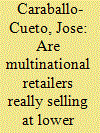|
|
|
Sort Order |
|
|
|
Items / Page
|
|
|
|
|
|
|
| Srl | Item |
| 1 |
ID:
163303


|
|
|
|
|
| Summary/Abstract |
This article presents the advanced financial literacy of Malaysian Gen Y investors and investigates whether literacy varies across demographics and ethnicity, and how financial literacy is related to investing decisions. In a survey-based study (N = 231) with the estimation of crosstab, ordered logistic regression and binary logistic regression, the results suggest that Gen Y investors display a medium level of financial literacy and that investors with certain demographic characteristics and ethnicity display a relatively higher level of financial literacy. Literacy items such as knowledge of stocks and bonds, functioning of the stock market, working of long-term bonds and mutual funds, and riskiness of bonds versus stocks are more closely related to investors’ trading, risky share investment, willingness of risk-taking, stock market participation and perceived portfolio returns. The results imply a clear scope to improve Gen Y investors’ financial literacy by concentrating on a certain socio-demographic groups and specific financial literacy items.
|
|
|
|
|
|
|
|
|
|
|
|
|
|
|
|
| 2 |
ID:
163302


|
|
|
|
|
| Summary/Abstract |
Currently, there is no systematic evidence showing that, 15 years or more after entry, all multinational retailers provide lower prices than domestic buying groups. In the short term, some multinational retailers may lower prices to deter local competitors and attract consumers in a ‘loss leader’ strategy. However, domestic competitors can integrate buying groups to share the benefit of economies of scale with multinational retailers, while holding lower profitability requirements and overhead costs than multinational retailers. We compared multinational retailers to domestic buying groups in a jurisdiction that had one of the highest proportions of Walgreens and Walmart stores in the world. Despite their market power, in our representative samples of goods, there is no evidence that the prices of multinational retailers in the sectors of pharmacies, supermarkets and hardware stores are lower than domestic chains.
|
|
|
|
|
|
|
|
|
|
|
|
|
|
|
|
| 3 |
ID:
163304


|
|
|
|
|
| Summary/Abstract |
Natural disasters cause serious economic and human losses. Yet there remains ambiguity in the existing literature with regard to their impact on the economy at large. This study re-examines the relationship between natural disasters and economic growth. It aims to contribute to a fairly limited literature on the economy-wide and sector-specific consequences of natural disasters in the short-to-medium term (up to 5 years). Further, it examines whether the disaster impacts are dependent on a country’s level of development. Based on panel data consisting of 102 (29 developed and 73 developing) countries over the period 1981–2015, it looks at the growth effects of four types of natural disasters, namely, floods, droughts, storms and earthquakes that were explored using the system generalised method of moments (GMM) approach. The results indicate that natural disasters have diverse economic impacts across economic sectors depending on disaster types and their intensity. The study confirms the findings of previous studies that the economic impacts of natural disasters are statistically stronger in developing countries. These findings may stimulate the policymakers especially in developing countries to explore the efficacy of viable ex-ante disaster risk financing tools (such as insurance, micro-insurance and catastrophic bonds). This would not only safeguard population and physical assets but also ensure adherence to the sustainable development goals.
|
|
|
|
|
|
|
|
|
|
|
|
|
|
|
|
| 4 |
ID:
163300


|
|
|
|
|
| Summary/Abstract |
Some recent articles have studied the link between the central bank’s monetary policy stance and the risk-taking behaviour of banks in the context of advanced economies. Loose monetary policy can encourage banks to reach for yield, which will increase their share of risky assets, and also induce them to use more short-term funding. We empirically examine the existence of this risk-taking channel of monetary policy transmission in India. We find that expansionary monetary policy may increase default risk particularly for foreign banks and new private sector banks. We also find that tightening of monetary policy leads to lower liquidity risk and market risk and the effects are stronger for foreign banks than for other bank groups. In terms of market risk, the effect on foreign banks is weaker in cases of monetary tightening compared to expansion.
|
|
|
|
|
|
|
|
|
|
|
|
|
|
|
|
| 5 |
ID:
163301


|
|
|
|
|
| Summary/Abstract |
Unincorporated enterprises often bypass formal regulations in general and taxation in particular. Bringing unincorporated enterprises under the taxation system is a challenge often faced by tax administrators, and it is in this regard that the present study explores the factors which influence the decision of unincorporated enterprises to register with the state value added tax (VAT)/sales tax authority across states in India. This analysis is limited to the decision regarding registration. It is not necessary that enterprises that are registered pay taxes and/or file returns—however, the process of registration does provide some information to the tax department for follow ups. The study throws up some interesting results for policymakers and tax administrators.
|
|
|
|
|
|
|
|
|
|
|
|
|
|
|
|
|
|
|
|
|